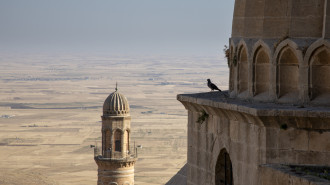Sudan orders TV channel off air as strikes continue
Sudanese authorities have ordered a private television channel to stop broadcasting after accusing it of operating without a licence, the network's owner has said.
Company executives deny the government's claim, while analysts have pointed out that the order came as a nationwide strike by disgruntled Sudanese workers was launched.
"Today at 8:30pm we received a letter from the authorities saying the channel has been stopped from broadcasting because it didn't have a licence," Hussein Khojali, owner of 24-hour entertainment network Omdurman Channel told AFP. "This is completely false."
He said the channel had obtained a licence six years ago when it was launched.
"We started six years ago. The letter also did not specify from when it was supposed to stop broadcasting."
Khojali, a newspaper columnist, also owns Alwan, a daily newspaper, and FM radio station al-Masah.
"We are doing our job in a professional manner," Khojali said. Several Sudanese and regional Arabic channels reported the order for him to stop broadcasting.
Twitter Post
|
Late on Sunday, Omdurman Channel was still on the air, but the order to switch the channel off came amid opposition calls for a strike against a government decision to cut fuel subsidies.
The three-day strike left several key squares and roads in Khartoum deserted as it began on Sunday, the start of the working week in the Muslim country.
It came after the authorities announced a 30 percent hike in petrol and diesel prices that has led to a sharp rise in the cost of other goods, including medicines.
Press Freedom
Journalists in Sudan frequently complain of harassment from the authorities, and the powerful National Intelligence and Security Service (NISS) often confiscates the entire print runs of newspapers over articles it deems offensive, rarely explaining why.
Twitter Post
|
Earlier this month, Sudanese security agents seized every copy of three opposition newspapers after they reported a rise in the country's fuel prices.
"Security agents came to our printers early this morning and took all copies of today's edition without giving any reason," Osman Mirgani, editor of one of the confiscated newspapers, said at the time.
In September 2015, all copies of al-Khartoum and al-Sudani newspapers were confiscated after they reported critical stories about water poisoning in the country's south.
The country regularly ranks near the bottom of international press freedom indexes.
It ranked 174 out of 178 countries on Reporters Without Borders' 2016 international press freedom index.
![Sudan journalists [AFP] Sudan journalists [AFP]](/sites/default/files/styles/large_16_9/public/media/images/8E8059B3-6874-4853-8BD0-5D446F38F8C4.jpg?h=d1cb525d&itok=j69pQpxj)






 Follow the Middle East's top stories in English at The New Arab on Google News
Follow the Middle East's top stories in English at The New Arab on Google News
![President Macron was at the game to show 'solidarity' [Getty]](/sites/default/files/styles/image_330x185/public/2024-11/GettyImages-2184064735.jpg?h=199d8c1f&itok=yXTymeCt)
![Israel demolished homes in the Silwan area [Getty]](/sites/default/files/styles/image_330x185/public/2024-11/GettyImages-2183868368.jpg?h=199d8c1f&itok=TweR8vd0)
